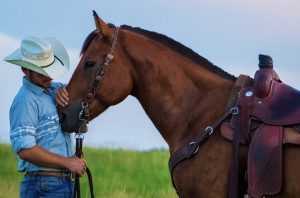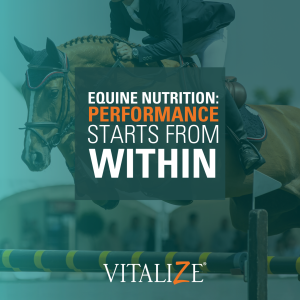
Horses on Declining Pasture
As the seasons transition and grass growth slows, many equine enthusiasts face the same challenges: how to maintain body condition, gut health, and performance when pastures start to decline. Pasture provides not only forage and nutrients but also a natural environment for movement and grazing behavior. However, as grass quality and availability decrease, whether due to drought, overgrazing, or seasonal change, horses often need extra nutritional and management support to stay healthy.
Understanding the changes happening in your pasture and adjusting your feeding program accordingly for horses on declining pasture is vital. It can make the difference between thriving horses and those that lose weight, condition, or digestive balance through the fall and winter months.
Recognizing the Signs of Declining Pasture
Declining pasture doesn’t happen overnight. It’s a gradual process that begins with shorter grazing periods, slower regrowth, and fading color. A few key signs your pasture is losing nutritional value include:
- Reduced grass height and density: Overgrazing or dry conditions prevent grass from replenishing.
- Weedy or bare patches: As desirable grasses disappear, less nutritious or unpalatable plants take over.
- Color changes: Grasses turn from vibrant green to dull green, yellow, or brown, signaling reduced chlorophyll and nutrient content.
- Horse behavior: Horses spend more time searching for forage or start showing signs they’re not getting enough nutrients, including chewing fences, trees, or dirt.
Once forage quality declines, it’s important to supplement the diet to provide consistent fiber, vitamins, and minerals while maintaining healthy digestive function.
The Nutritional Shift: What’s Missing
Fresh pasture is one of the most complete natural feeds. A forage-based diet for horses is important because horses were born to be natural grazers. Lush pastures offer natural moisture, digestible fiber, and a variety of vitamins and minerals, particularly vitamin E and omega-3 fatty acids. However, as pasture declines, several changes occur that will require you to supplement your horses nutritionally.
1. Fiber Content Increases
Even though the fiber content increases, horses on declining pasture experience decreased digestibility. Mature, stemmy forage is difficult to break down and provides less energy.
2. Protein Levels Decrease
Horses on poor-quality pasture may lose topline and muscle tone over time due to lowered protein levels without supplementation.
3. Vitamins Diminish
The natural Vitamin E and carotene – used to make Vitamin A – in green grass disappear as the grass dies or dries out.
4. Moisture Content Decreases
Drier forage means horses typically drink less, and a dehydrated horse increases its risk of impaction colic.
Recognizing these four changes helps guide how you can support your horse nutritionally as the season progresses.
Maintaining Digestive Health
The diversity and stability of a horse’s gut microbiome starts to decline when pasture quality decreases. A consistent fiber source is crucial for maintaining smooth digestive tract function. Horses rely on beneficial microbes in the hindgut to ferment fiber and produce volatile fatty acids, their primary energy source. Learn more about horse hindgut fermentation.
When forage quality drops or diet changes suddenly, the gut microbes can shift out of balance, leading to lose manure, weight loss, or colic. Oftentimes, adequate pasture management for horses is not enough. We offer three tips to prevent digestive health issues for horses on declining pasture:
1. Provide Adequate Long-stem Forage
- Introduce hay gradually and ensure horses consume 1.5–2% of their body weight in forage daily.
- Choose high-quality grass or alfalfa hay to replace lost nutrients and calories.
2. Support Fiber Digestion with Prebiotics
- Prebiotics such as AO-Biotics® Amaferm®, a precision-based prebiotic, enhance fiber fermentation efficiency, helping horses extract more energy from every mouthful.
- Products like Vitalize® Alimend® or Vitalize® Equine Digest More® Plus, both powered by Amaferm, support the gut’s microbial population and improve fiber digestion.
3. Feed Smaller, Frequent Meals
- Horses are grazers by nature. When pasture is limited, spreading hay feedings throughout the day mimics natural grazing behavior and promotes digestive stability.
Hydration & Salt Intake
Declining pasture means drier forage and lower water consumption, especially as temperatures cool. This combination increases the risk of dehydration and impaction colic.
Horse owners can encourage proper hydration in several ways. Provide clean, thawed water at all times. Heated water tanks can encourage horses to drink more in cold weather.
Offer free-choice salt to encourage drinking. Horses often reduce water intake when salt is missing. Loose salt or mineral blocks help maintain electrolyte balance. Even small hydration improvements make a big difference for digestive health when pastures are dry or dormant.
Balancing Vitamins & Minerals
As green grass fades, vitamin and mineral imbalances are one of the most common issues seen in horses on declining pasture. Horses may appear healthy but develop deficiencies that impact coat condition, hoof health, muscle tone, and immunity.
To fill the nutritional gaps that horses on a declining pasture experience, provide supplements as needed.
Provide a Vitamin & Mineral Supplement
- Choose a supplement specifically formulated for horses on hay or dormant pasture.
- Look for balanced levels of copper, zinc, and selenium to support hoof strength and immune health.
- Pasture is the best natural source of vitamin E; however, dried hay contains almost none. Supplementing with natural vitamin E supports muscle recovery, nerve health, and immune function—especially for performance or senior horses.
Support Fatty Acid Intake
- Omega-3 fatty acids decline as grass loses color. You may wish to supplement with flaxseed, camelina or other stabilized oils to maintain skin and coat health.
Managing Body Condition
When pasture quality declines, calorie intake can drop significantly, especially for easy keepers who depend solely on grazing. Monitoring Body Condition Score (BCS) at least monthly helps you catch subtle changes before they become major issues.
For easy keepers:
- Restrict hay slightly but never below 1.5% of body weight.
- Use slow-feed hay nets to extend eating time and prevent boredom.
- Choose low-NSC (non-structural carbohydrate) forages if weight gain is a concern.
For hard keepers or performance horses:
- Add calorie-dense feeds such as beet pulp, rice bran, or fat supplements to replace lost energy.
- Providing supplements with prebiotics like Amaferm can improve fiber digestibility and nutrient absorption, helping horses maintain condition without increasing feed volume.
Consistency is key. Avoid sudden feed changes and monitor both appetite and manure quality.
Access & Rotation for Horses on Declining Pasture
While we suggest supplementing the diet, proper pasture management also plays a role in supporting horses on declining pasture. Overgrazing not only depletes nutrients faster but also damages plant roots, making next season’s growth slower and less productive.
- Rotate pastures to allow sections to rest and recover.
- Use dry lots or sacrifice areas during wet or dormant seasons to preserve main grazing areas.
- Drag and reseed bare patches when the weather allows to maintain a healthy stand of forage.
- Test your pasture soil every few years to ensure pH and nutrient balance support grass regrowth.
Sustainable pasture management protects your long-term forage resource while keeping horses on a more stable feeding plan.
Supporting Behavior & Mental Health
Horses on declining pasture often become frustrated or bored due to reduced grazing time. This can lead to undesirable behaviors such as wood chewing, cribbing, or aggression.
Keep horses on transitioning pasture content by:
- Providing ample hay or enrichment feeders to satisfy the desire to chew.
- Offering turnout or social contact whenever possible.
Satisfying their grazing instinct supports not just digestive health but also mental well-being.
Transitioning to Full Forage or Hay Diet
Eventually, most regions experience a complete regression in pasture growth. That’s why you can’t simply assume you don’t need to worry about pasture management for horses. However, you don’t want to be overly reactive—a measured approach is key. Gradually transitioning from pasture to a full hay diet helps maintain digestive balance. Follow these simple steps:
- First, introduce hay early. Begin supplementation before pasture depletion to help gut microbes adjust effectively.
- Then, adjust feeding rates slowly. Over several weeks, increase hay as grass availability decreases.
- Next, keep the feed consistent. Avoid frequent changes in hay type or concentrate formulas, as this can lead to digestive upset.
- Finally, monitor manure consistency. Loose stools or dry fecal balls can signal digestive imbalance or hydration issues.
A gradual approach ensures your horse’s digestive system remains healthy during the seasonal shift.
Vitalize Products Support Horses on Declining Pasture
BioZyme’s Vitalize line offers science-backed nutrition to help horses transition smoothly from lush grazing to drier forage seasons. Each product contains Amaferm, a research-proven prebiotic that enhances digestibility and nutrient absorption.
Vitalize Equine Digest More Plus improves fiber digestion and supports hindgut health during forage transitions.
Vitalize Alimend provides natural gastric support, helping maintain stomach comfort in horses that experience stress, such as become more frequently stalled as the seasons change.
We’ve mentioned just a few of our Vitalize products. We hope you will check out all the products Vitalize offers to keep your horse’s digestive system healthy and efficient, no matter the pasture conditions.
More About Vitalize
We’re talking to you about horses on declining pasture because Vitalize focuses on nutritional solutions for animal health. Vitalize is a line of supplements for horses, dogs, and cats with proven solutions to keep your animal healthy and performing. We are a renowned brand of supplements designed to enhance equine health and promote a good gut feeling for horses and owners alike.
Vitalize is part of the BioZyme Inc. family of brands. BioZyme is a global fermentation company pioneering solutions in animal nutrition and health. Through innovative research and high-quality manufacturing, BioZyme creates powerful products with an undeniable impact. With a continued commitment to excellence, the BioZyme Stockyards location earned the American Feed Industry Association (AFIA) and Feedstuffs 2024 Feed Facility of the Year honor.
With BioZyme, you can trust safe, accurate products for your horse. Equine supplements from Vitalize are made in the U.S.A. and meet several quality standards.
- BioZyme is a member of the National Animal Supplement Council (NASC), and its Vitalize products carry the NASC Quality Seal on products specifically designed for the equine and companion animal health markets.
- Vitalize products contain ingredients backed by research and multiple U.S. patents.
- Vitalize utilizes an ionophore-free closed production system. BioZyme takes great care to manufacture Vitalize products safely and prevent any risk of ionophore contamination.
- Vitalize products are show-safe, with several Vitalize equine supplements being Clean Sport tested.
Final Thoughts
Declining pasture quality is a natural part of the seasonal cycle, but it doesn’t have to compromise your horse’s health or performance. By recognizing the early signs of nutrient loss and taking a proactive approach, one can balance forage, hydration, vitamins, and digestive support. With proactive management of horses on declining pasture, you can help your horse stay healthy and happy year-round.
Whether you’re managing one pleasure horse or a barn full of performance athletes, consistent nutritional support through the changing seasons is key. Partnering with trusted products like Vitalize, powered by Amaferm, helps ensure your horses get the most from every bite, keeping them in top condition even when the pasture fades.
Get Your Vitalize Now
Now’s the perfect time to plan ahead dietarily for ongoing nutritional management for horses. Are you ready to purchase your Vitalize products to give your horse a boost in equine nutrition? You can order them online or from one of our authorized online retailers.
Perhaps you like to shop locally. Check out where to buy Vitalize products near you.
Want to learn more about all of the Vitalize products that can give your horses a #goodgutfeeling? Sign up for our monthly newsletter or visit the Vitalize Product Navigator.

